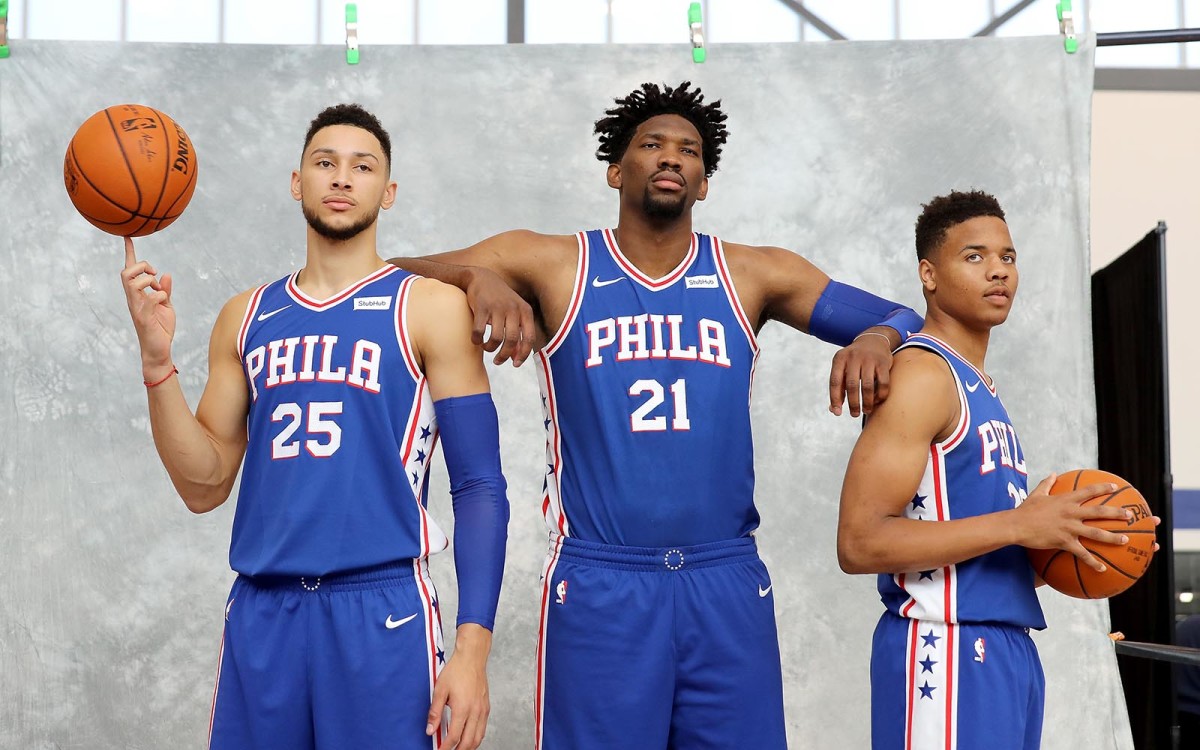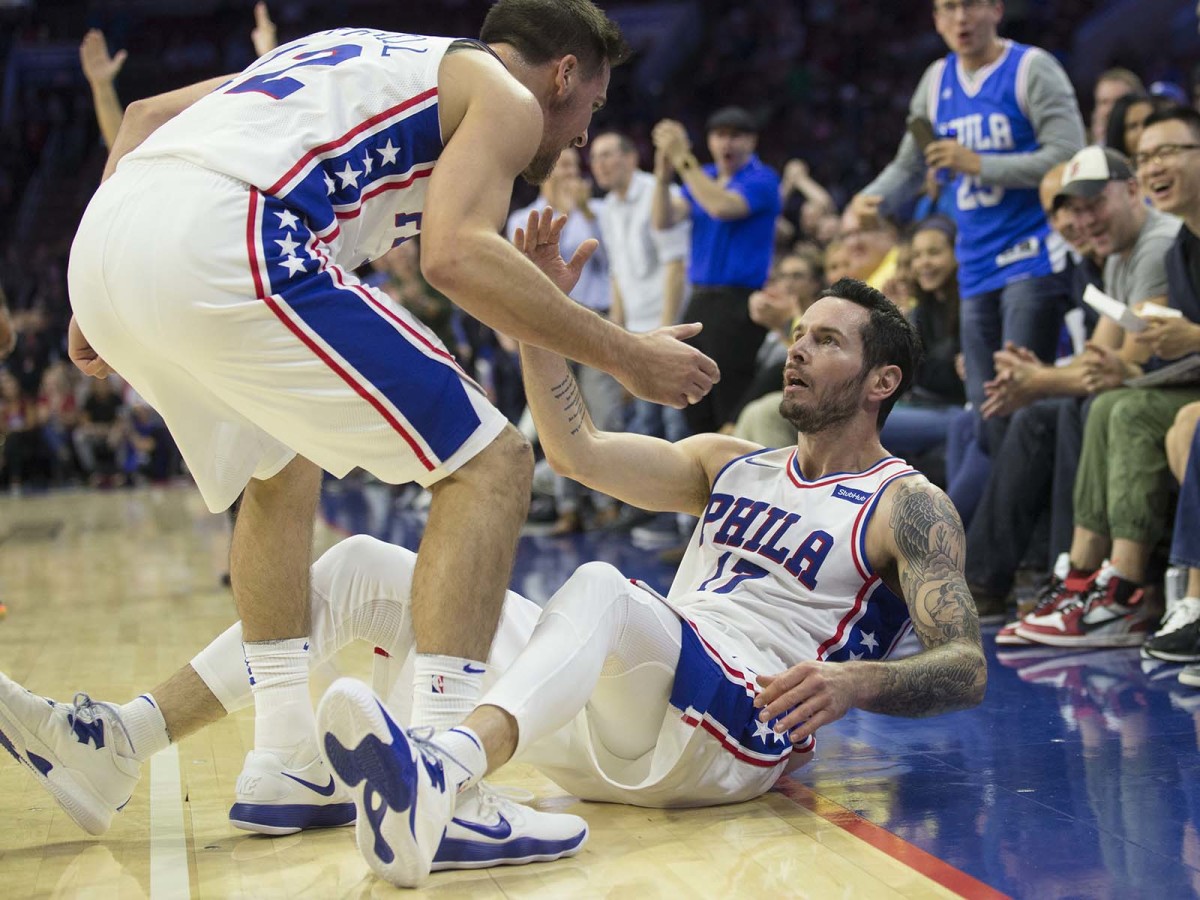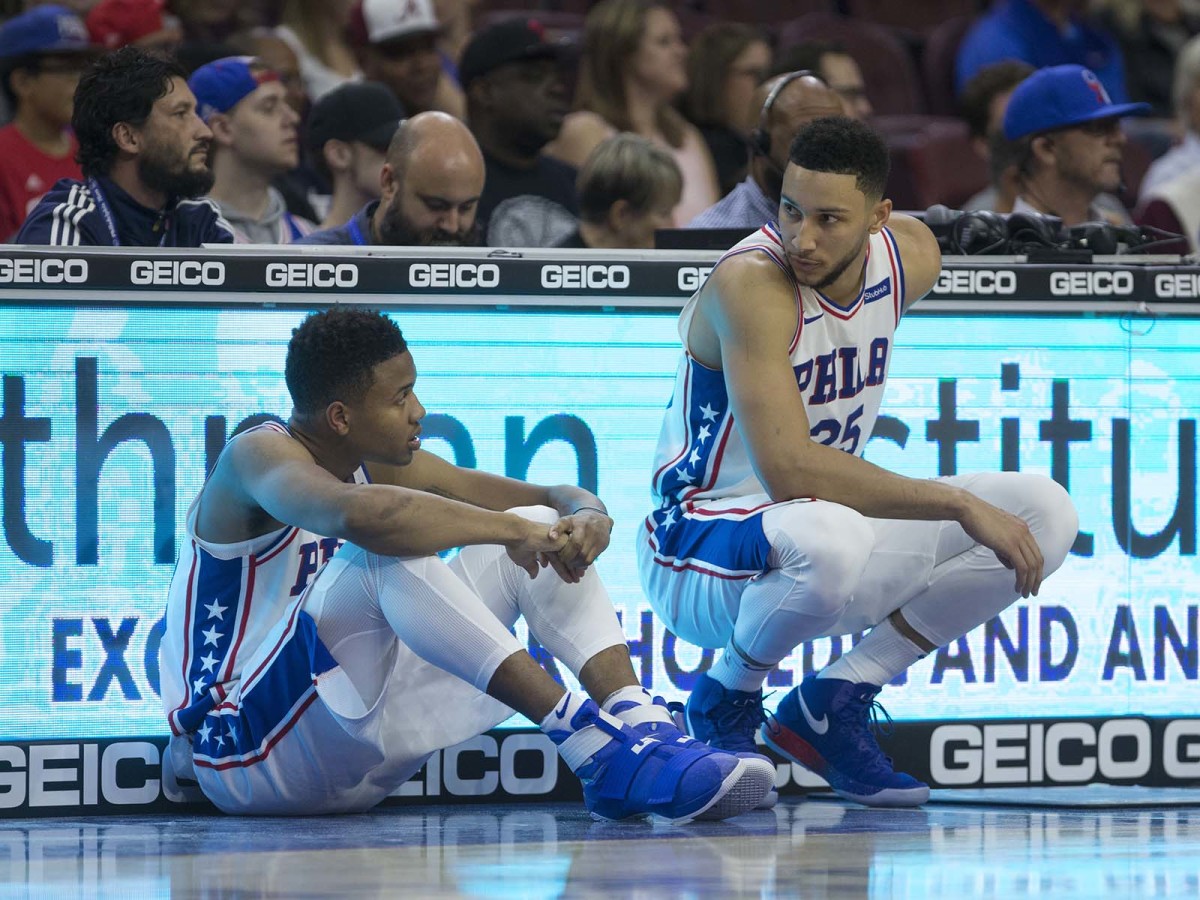Process 2.0: The Terrifying and Wonderful State of the 76ers

Joel Embiid had been bouncing around media day for an hour before he sat down. First, he asked a team employee for a new uniform because he'd sweat through the one he had on. Then he talked about The Process, and staying healthy, and this year’s push for playoffs. He thought back to the first few seasons in Philly, when he was hurt and miserable and wanted to go home. He talked about Cameroon, where he grew up playing soccer, mostly ignoring the NBA. Then everything changed when someone gave him a Hakeem Olajuwon highlight tape, and he watched it six or seven days a week for three years straight.
Wednesday night he played his first basketball game in nine months, and he had 22 points and 7 rebounds in 15 minutes. “They can’t f---ing guard me,” he said in the second quarter.
At this point it’s probably trite to say that Embiid explains the Sixers, but he really is everything that’s terrifying and wonderful about this team. Off the court, as Markelle Fultz said, "Whether you're having a good day or bad, he's gonna bring the joy out of you." On the court he's a bigger version of Anthony Davis, with per-36 numbers that can block out the sun. Said teammate Dario Saric: "If you don't know what to do on offense, just pass the ball to Joel.”
"He's so uniquely gifted," 76ers coach Brett Brown explained. "The team knows it. There's a confidence he produces when he's on the court with his teammates, where they really, legitimately have a chance to beat anybody. He walks this line, being all that to the team and to me, and then you get out of it, and he's got a playful side. He's very endearing. And he's good. The package is very, very special. To think what he has done in only 31 games, it's dizzying. He has no right to have this profile. He has no right to be this good after only 31 games. Yet he is."
This is where every Sixers story has to begin. Watch Joel Embiid on the court, or watch him sweat his way through an hour of photo shoots and interviews, and you will come away nodding at every Brett Brown quote and rooting for this to succeed.

But once you begin to care, you can’t help but worry. You realize how scary it is to get invested in a player who's missed more games than he's ever played. You remember the history of big men with lower body injuries, from Walton to Sampson to Oden to Bynum. Objectively speaking, this probably won't end well.
Speaking of which, this week Embiid signed a $148 million contract extension, and next week, the Sixers will enter the regular season with the highest expectations they've had in years.
"My goal is to make the playoffs," Brown said. "It was the first sentence out of my mouth on opening day, in front of my team privately. And I understand what that means. We went to the playoffs every one of my Spurs seasons. Different things are going to have to take shape [in Philadelphia]. Health. Defense. Two rookies that have never played a second of NBA basketball. Winning in the NBA is hard. It's really hard. But as opposed to backpedaling from that goal, I lean into it. That's my goal for the city of Philadelphia and for our team, that's how I see it."
So, Sixers. Playoffs. Here we go. And also, how did we get here?
Sam Hinkie was hired in May 2013 to run the 76ers. Shortly thereafter, he traded Jrue Holiday to New Orleans for a 2014 first-round pick and the No. 6 pick in the 2013 draft, Nerlens Noel. That deal was widely considered a win for Philadelphia at the time, and it was the first step toward overhauling a roster that had peaked near the middle of a mediocre Eastern Conference. This was healthy. This was smart. But it wasn't until the following February that The Process got real.
It began a few days before the All-Star break. Chris Paul was returning to the Clippers' starting lineup after missing 18 games games with a separated shoulder, and almost as soon as the game began, it was a massacre.
The Sixers trailed by 31 after the first quarter. They shot 15.4% in the first half. They lost by 45. J.J. Redick didn't dress for the Clippers that night, but he watched it all unfold from the bench.
"I remember thinking, 'It seems like we’re not playing an NBA team.' And I don’t mean any disrespect. But it just seemed like the two teams were sort of moving at different speeds. It was painfully obvious," he said.
Brett Brown was in his first year with the team at that point. "I'll tell you,” he said, “It didn't get any easier the next night. I think we lost by 50 to the Warriors." Technically, it was 43. That night featured a career-high 32 points from Marreese Speights, and a young fan in the Bay Area crowd who looked like she'd just witnessed a car accident. A week later, the team traded Evan Turner and Spencer Hawes for second–round picks, and the locker room officially belonged to Michael Carter-Williams and Tony Wroten. That was The Process.
"I was so spoiled in my San Antonio life," Brown said of his time as an assistant during the Spurs' title runs. "It was a really, really big deal to lose two in a row, let alone lose in these long streaks. So much of my personal evolution had to be, 'How do you put it in perspective?' We were trying to develop young guys. We were trying to identify keepers. But you know, you'd sit on the sideline looking at the scoreboard and from time to time you had to be grounded, so you didn't have meltdowns."
Altogether, the Sixers lost 253 games in four years. Under Hinkie, the team took on bad contracts in exchange for picks, and they traded young players in exchange for more picks. They stocked the back-end of the roster with second–round picks and undrafted free agents, and they drafted players who couldn't contribute immediately, because winning in the short term wasn't the point. Losing only gave them more chances to win at what mattered—the NBA draft.
Redick, who signed a one-year, $23 million deal with Philly over the summer, thought the Sixers were a blight on the sport. "Without naming Sam and Philly, I would actively, publicly, express my disappointment and disgust with The Process and what Philly was doing."
That brings us closer to present day, and another Clippers game.
It was late January last season, and Brett Brown called a timeout two minutes into the third quarter. Redick had just hit his fourth three of the night, and DeAndre Jordan added an alley-oop, and the Clippers were up 19. Embiid was sitting out after playing the night before. But then it all changed. Nerlens Noel played his best game of the year, Richaun Holmes started mauling people, and Philly went on a 46-15 run to steal the win in the second half.
"I remember that game vividly," Redick said. "The arena was probably like 70%, 80% full. But it was as loud as any NBA arena that I’ve ever played in. I mean, it was like Boston in the playoffs. So loud. And I remember thinking at the time, man, if these guys ever had a really good team, this place would be on fire."
It was one of a dozen nights in December and January that prompted double takes all over the NBA. There were game-winners against the Wolves and Knicks, home wins against the Hornets and Blazers, and two dominating wins against Giannis Antetokounmpo and the Bucks. With Embiid healthy, the defense was elite and the offense was above-average, and the Sixers were, unbelievably, pretty good. They went 11–5 from Dec. 30 to Feb. 1.
The peak was probably the Raptors game. That night culminated with Robert Covington smothering Kyle Lowry on the perimeter and funneling him to Joel Embiid who looked 10–feet tall when he blocked Lowry's floater to seal the win in the final minute. It was like Process fan fiction.
"I've always broken the season down into thirds," Brown explained. "The start of the year til Christmas break, Christmas break til the All-Star break, and the All-Star Break to the end. That middle third, we started playing."
Every story about this year's Sixers team will mention health or this summer’s additions, and that’s not wrong. But the team started believing in 2017-18 during the middle of last winter. "I can't really put it into words," T.J. McConnell said. "It was incredible. The fans, the passion throughout that January. I think we had one of the best records in the NBA that stretch. It shows what we're capable of when we're healthy. Then we add pieces, and with a city like this supporting you… it's awesome."

"I felt like it validated all the work," Brown added. "I've always felt like what we were doing was professional and solid, but it was hard to feel like it was being rewarded. We were just trying to have great days. We assumed that eventually they'd add up. And all of the sudden, they added up."
The dividends were short-lived, of course. Three days after that Clippers game, Embiid hobbled off the court during a nationally-televised game against the Rockets. From there he was sidelined indefinitely with a "bone bruise" that was later revealed to be a meniscus tear. He sat out the rest of the season.
But now it’s a new season, and there’s more help, and most importantly, Embiid looks healthy.
"He was a huge factor in me coming here,” Redick said. “I joked with him the other day when he was in the training room. ‘Joel, this is not what I f---ing signed up for! Get back on the court!’"
It would be tempting—and probably accurate—to reduce all 2018 Sixers forecasts to Embiid. He personifies all the youthful energy, mind-bending potential, and orthopedic anxiety that comes with this team—so do the clauses in his new contract. But in practice, Embiid’s only half of what will make the Sixers fascinating every night.
There's also Ben Simmons, a 20-year-old rookie whose game is somewhere between Giannis and Rondo's. At 6'10" with a jump shot that may or may not materialize this decade, he'll be your starting point guard opening night. "Not point-forward," Simmons said. "Point guard. You see Kyrie Irving starting at point? I'm starting at point."
That plan will be an adventure of its own. Brown is confident that the jumper won’t be a problem. As the coach explained, "The areas we've focused on most have been his free throws and his finishing. In halfcourt, it's not like we set a pick-and-roll and four guys stand there. We move a lot. And it's hard to sag against speed. I hear the opinions. You know, 'People aren't going to play him, they're gonna sag off him.' I think it sounds easier than it really is. If it were a half court, static game, it's easier. But that's not how he plays, that's not how we play, so I think it'll be more difficult."
Then there's the other rookie No. 1 pick with jumper concerns. The Sixers drafted Markelle Fultz in part because his athleticism and shooting would pair so well next to Simmons. But over the summer, Fultz took a perfectly fine 41% three-point stroke at Washington, re-worked his mechanics, and made things more stressful. In fact, watch enough preseason Fultz free throws and you might give yourself a panic attack.
"There were some things that went around the internet," Brown said. "Kinda got viral and brought attention to it. Nobody’s worried. He's done this before, and we can get [the jumper] back to where it needs to be. And you know, he's 19 years old. When you study the history of 19-year-olds, so much of this is to be expected. It's going to be a learning year for him."
Then there’s the coach, himself. This will be Brown’s fifth year in charge. McConnell called the coach "the greatest dude on earth." Ben Simmons echoed that sentiment: "On or off the court. Family. Anything I need, I can go to him." After overseeing some of the worst teams in recent NBA history, Brown might deserve a healthy, winning roster more than anyone in the NBA. He would also seem to be a convenient scapegoat if that doesn’t come to fruition this year.

When I mentioned the double-edged sword of Sixers expectations to GM Bryan Colangelo, he pointed out two things. First, yes, this year's Eastern Conference is wide-open enough to dream big. But he added high expectations aren't fair, either. "To put the expectations on a coach," Colangelo said, "where literally you’re pushing out two No. 1 picks in the same year, saying, ‘Go win basketball games on a consistent basis.’ It’s really a tough challenge."
Beyond the top–five picks, there’s also undrafted Robert Covington, Philly's version of the Jae Crowder role player who becomes twice as valuable on a good team. Maybe he's finally found that team? Next to him is Dario Saric, the hybrid forward who probably should've won Rookie of the Year last season, and whose streaky shooting may or may not fit next to Simmons this season.
For now, Saric arrived on the eve of training camp thrilled to be back. "I missed T.J.," Saric explained. "Joel, Timmy, Nik [Stauskas], the coaches. Now we're all here and for the next six or seven months. We all share the gym, the court, share the everything. You can't be nothing else but a happy man. I'm a happy man.”
McConnell is happy, too. Maybe a little stunned. About the Redick signing: "My rookie year we won 10 games. I don't think many people were jumping to be a part of that." And about his place on the team: "Someone said I'm close to being a vet. I'm like, 'This is my third year. What are you talking about?' Then I took a step back and realized, I'm one of the oldest guys on the team. I'm 25."
All these players are part of what makes this team dangerous to believe in, and kind of impossible to root against.
Like J.J. Redick in 2014, I was once a Process skeptic. My problem with the plan wasn’t the tanking, but the implication that Sam Hinkie’s strategy was a smarter way to build a title contender. Just because something’s counter-intuitive doesn’t mean it’s more intuitive. Even now, looking at the Sixers and the rest of the league, I’m not sure I was wrong. But after 10,000 debates on the Internet about what Hinkie did, I think we were all having the wrong argument.
Everything J.J. Redick Does is From Long Distance
Look at the current roster in Philadelphia. It’s a disjointed collections of mercurial top-five picks, undrafted cult heroes, European sensations who were never coming to America, and high-priced veteran rentals who never imagined they’d come to the Sixers. Expecting this team to make the playoffs is as audacious and ridiculous as expecting Ben Simmons to match up with John Wall on opening night.
On the other hand, everyone who watches this sport can’t wait to see what Simmons does in that game. Embiid, too. And most everyone who watches will be rooting for the Sixers.
The truth about The Process is coming into focus this year. Extreme tanking may not be the best way to build a title team, but it might be the most interesting.
Compare Philly to the alternatives. Teams like the Magic, Suns, Pistons, Kings, and Knicks have all missed the playoffs for the past four years, but they never really tanked, and they'll all be perfectly forgettable for the next seven months. Whether the Sixers win or lose, they'll be appointment television for anyone who cares about the NBA.
For his part, Redick said he's changed his mind on Hinkie's tactics over the years. And it's true, this could be the $23 million talking. But if his perspective has evolved here, he's not the only one.
"I think part of it is just a byproduct of maturity," Redick said. "Understanding the NBA a little bit more, and understanding what Sam was trying to do. People always bring up, 'It's not fair to the fan base, it’s not fair to the fan base.' I think there’s something to be said for that. But the reality is, now season tickets are sold out.”
